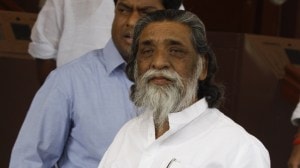How many PAPs of Koyna, other projects ‘illegally’ allotted ‘valuable’ govt land despite compensation availed in 1961, asks Bombay HC
The court bench said "false and bogus allotments of lands" are made without specifically determining entitlement of such persons
 The Bombay High Court bench added that large plots of government lands appeared to have been allotted at a "throw away price" after a long gap of over 50 years and the same was "brazenly illegal." (File photo)
The Bombay High Court bench added that large plots of government lands appeared to have been allotted at a "throw away price" after a long gap of over 50 years and the same was "brazenly illegal." (File photo)Expressing “shock” over “illegal” allotment of “valuable” government lands, the Bombay High Court recently directed the Maharashtra government to inform in how many cases, the litigants have claimed to be Project Affected Persons (PAPs) of Koyna dam project in 1961, or other similar projects, to which provisions of new rehabilitation laws were not applicable, but still they were granted alternate lands under such laws.
The court, while raising “serious concerns”, said that the state has to conduct an enquiry to ascertain whether any “fraud is played in allotment of valuable government lands,” in which persons whose land acquisition process was concluded in 1961 with award of compensation, had again sought and got allotment of alternate lands as per 1999 scheme.
The bench said that the same “cannot happen unless there is connivance of the official machinery and there is a clear modus operandi to resurrect such dead matters and process of court is also abused.” It sought the Principal Secretary of the department concerned to look into the issue and respond to the court.
A division bench of Justices Girish S Kulkarni and Jitendra S Jain on July 19 was hearing a contempt plea by one Shivpratap Krishnarao Patankar, whose land in Satara district was acquired for the Koyna dam project in 1961. Petitioner claimed that he was a PAP entitled to the benefit under the scheme of the Maharashtra Project Affected Persons Rehabilitation Act, 1999 and authorities did not comply with HC order directing allotment of alternate land to him. Instead he was alloted ‘non cultivable’ land in Raigad district, 350 kilometres away from his land acquired for the project.
However, Additional Government Pleader S S Bhende submitted that in prior order the court had in fact held that Patankar was ineligible for the benefit. Bhende added that Patankar was granted compensation in 1961 when neither 1999 law , nor the Maharashtra Resettlement of Project Displaced Persons Act 1976 were in force and the same could not be applicable in retrospective manner. It “certainly shocks our conscience,” the bench noted.
Seeking probe by the government, HC said, “We may also observe that in the absence of any legal right, if persons under the garb of the project affected persons of Koyna project or any other similar projects have grabbed and/or have become illegal beneficiaries of government lands, it is a matter of serious concern.”
The bench said “false and bogus allotments of lands” are made without specifically determining entitlement of such persons and merely on non-contest by government officers, same would not have any legal sanctity. “Such allotment would be required to be considered to be fraudulent and illegal grabbing or securing of government land, by such a person,” it held.
It noted that the reason for the same was that under the scheme of 1999 law, 65 percent of the compensation received could be deposited with the state government to claim allotment of alternate land. The bench said, using the same provision, the PAPs who would have received Rs 1000 as compensation in 1961, deposit Rs 650 with the government and claim allotment of alternate land despite the 1999 scheme not being applicable to them.
The bench added that large plots of government lands appeared to have been allotted at a “throw away price” after a long gap of over 50 years and the same was “brazenly illegal.”
Explaining the “modus operandi,” the bench said such persons make representation after a lapse of 50-60 years before the authorities and then writ pleas are filed in courts seeking orders that their representation be heard by the authority. Under the garb of such orders, the official machinery considers such cases and allot the land by making them eligible in “totally illegal and high handed manner.” Moreover, contempt pleas are filed if possession of land is not handed over.
The bench noted that “official machinery is totally abused in making such allotments” and property agents may also be involved. “The beneficial legislation for the project affected persons under the 1999 Act cannot be abused in such a manner,” it noted.
The bench also asked Advocate General Birendra Saraf for state to appear before it during the next hearing on August 2.












